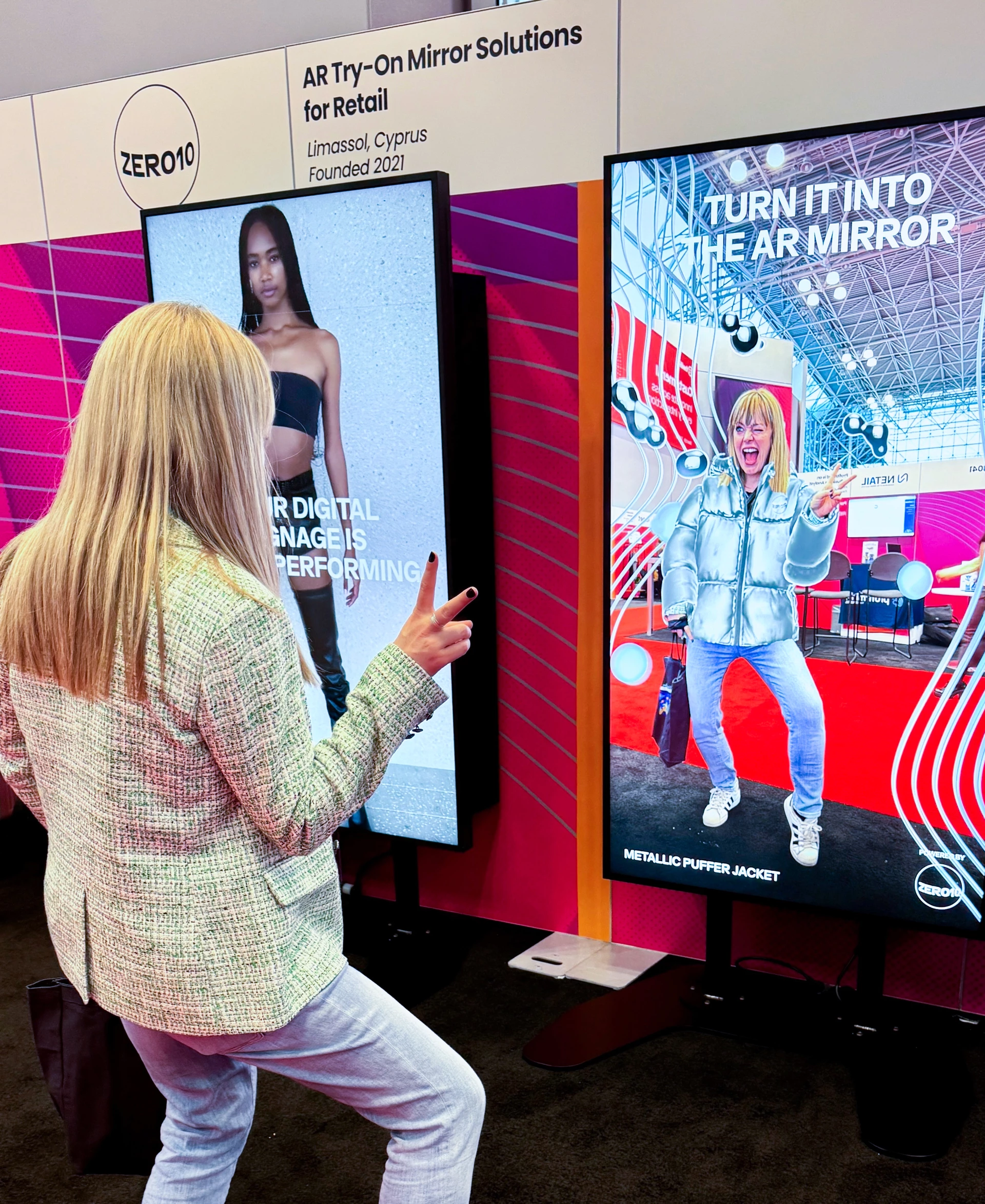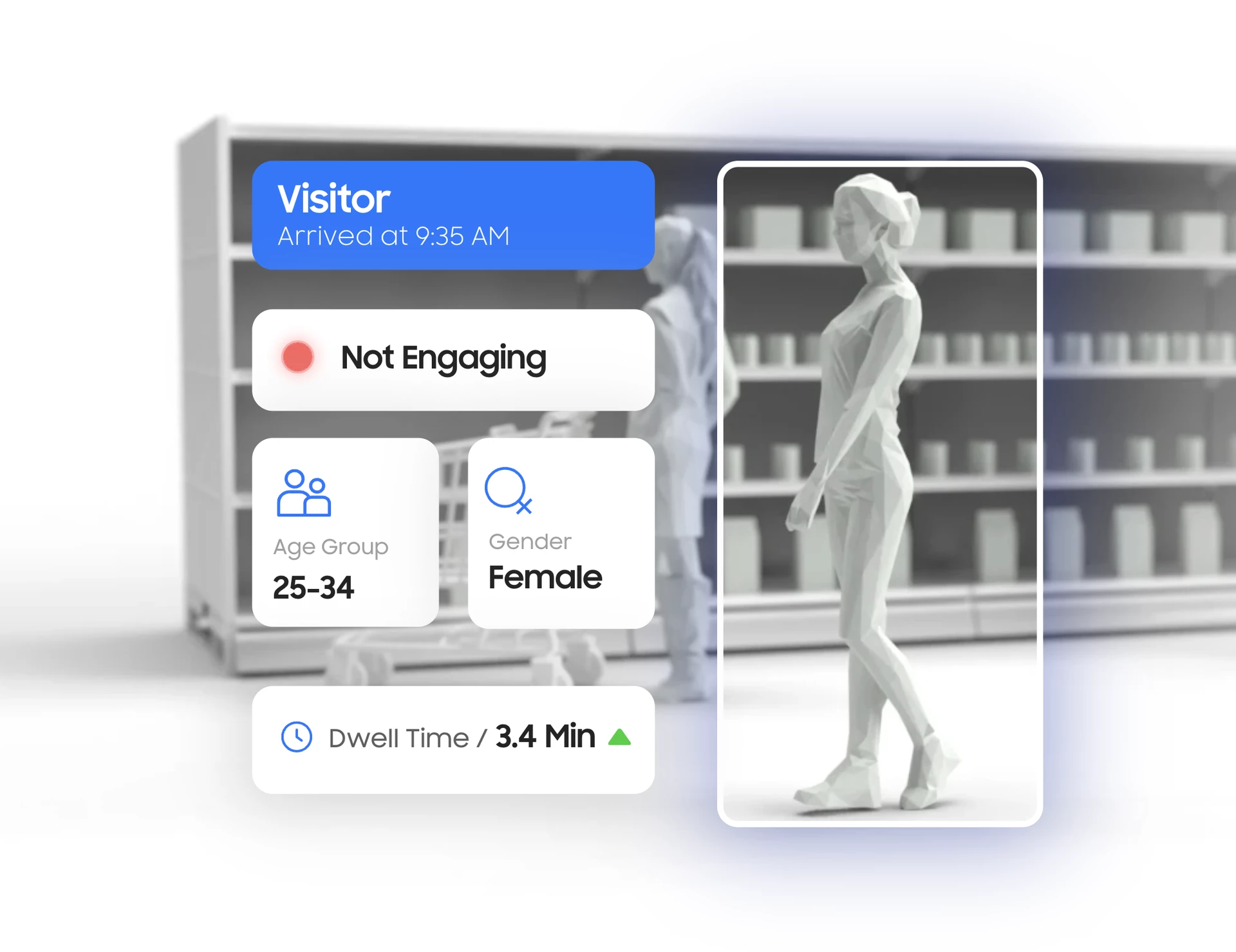- AI
- Retail
Reinventing retail: key trends and innovations
January 30 — 2024

The rapid evolution of retail, driven by technological innovation and changes in consumer behaviour, is ushering in a new era of personalization and efficiency.
In this article, we explore the key concepts shaping the future of retail, based on what our experts learned while attending NRF 2024: Retail's Big Show, hosted by the National Retail Federation. From integrating artificial intelligence for advanced personalization to strategic cost management, the trends reveal an ever-changing retail landscape poised to meet ever-higher customer expectations.
Innovation for personalization
In the ever-evolving retail industry, cutting-edge technologies are transforming our interactions with customers. AI algorithms sift through customer data to decode their shopping preferences and behaviours. Meanwhile, augmented reality immerses consumers in unparalleled experiences. These advancements empower retailers to craft personalized experiences, making each online and offline interaction not just unique, but also a memorable one, finely tuned to each individual's tastes and preferences.

Technologies Revolutionizing the Virtual Fitting Experience
Zero10 specializes in creating augmented reality (AR) experiences, primarily for the fashion industry. Its technology allows shoppers to virtually try on apparel and accessories using AR, combining the convenience of e-commerce with an interactive and personalized user experience.
Booth.ai uses artificial intelligence to transform simple photos into compelling visual content that enhances product catalogues. In the future, these technologies are expected to generate personalized images for customers and integrate them into specific scenarios that showcase products that can be tried virtually from the comfort of the customers’ own homes.
AI image recognition and privacy protection
The integration of AI image recognition into retail offers advanced capabilities for profiling and analyzing customer behaviour. However, it comes with a great responsibility to protect consumer privacy. Retailers must combine innovation and ethics by adopting clear policies that respect personal data. By carefully balancing technological innovation and respect for privacy, companies can offer their customers a revolutionary experience while maintaining trust and strengthening brand loyalty.
Cyclops uses AI to evaluate in-store experience in real time
Dayta's Cyclops technology is designed to connect with existing camera systems in retail stores to collect information on traffic, customer behaviour and demographics. Using artificial intelligence, Cyclops analyzes and interprets this data to provide detailed reports on the in-store customer experience and targeted recommendations.
What's more, this technology guarantees privacy: it avoids the use of facial recognition and does not store any personal or sensitive data.

Omnichannel experiences
In today's digital era, the boundaries between online and in-person shopping are increasingly becoming indistinct. Retailers are ingeniously blending technology with human touch to forge seamless shopping journeys across different sales channels, ensuring a fluid transition from the virtual to the physical. This shift leads to a more cohesive shopping experience, where brand consistency is upheld across multiple platforms, delivering an engaging and tailored experience to each customer.

The Glossier Way: A consistent experience across the board
Glossier is a prime example of a successful omnichannel experience. Originally an online-only beauty company, Glossier opened physical stores to expand its presence while maintaining its direct-to-consumer (DTC) model. The expansion allowed Glossier to reach a wider audience and provide a more immersive experience for customers.
Glossier's strong online community and use of influencer marketing was leveraged to create additional buzz. Opening physical stores was a natural step for the brand, allowing for more personal interactions and deeper relationships with customers through digital consultations and in-store product trials.
Composable architecture
Composable architectures in retail provide a flexible and modular technology approach and provide efficient communication mechanisms via APIs. Unlike traditional monolithic architectures, composable architectures allow specific solutions to be chosen for specific problems, reducing vendor lock-in. This approach promotes greater adaptability and security over the long term, enabling retailers to respond quickly to market and technology changes. By adopting a composable architecture, retailers can remain competitive, updating or replacing technologies without disrupting their overall infrastructure. This enables them to respond quickly and effectively to the ever-changing needs of the marketplace.
The Impact of Composable Architecture at Levi's
In the People Changing Enterprises podcast from ContentStack, Zach Crittendon of Levi Strauss testified to the effectiveness of composable architecture in developing new user experiences. This approach allowed great flexibility in combining and deploying different elements across multiple channels, as illustrated by the ease with which Levi's 150th anniversary, a major event for the company, was prepared.
In contrast to the challenges of a traditional monolithic architecture, the composable architecture simplified the integration of content and the implementation of experiences across Levi's website and app. Most of the effort was focused on experience design, with rapid implementation in the Contentstack CMS, facilitating access to content across channels.

Sustainability and cost efficiency
Sustainability and cost-efficiency in retail, enhanced by artificial intelligence, represent a holistic approach to optimizing operations while reducing environmental impact. The integration of AI enables better inventory management, minimizing waste and maximizing resource utilization. This technology also plays a key role in product traceability, ensuring the sustainability of the supply chain. By adopting these practices, retailers can not only achieve significant cost savings, but also meet growing consumer expectations for environmental responsibility.
Supply chain optimization with Pivot88 and AI
Using artificial intelligence, the Pivot88 platform provides detailed, global analysis of products from design to end of life. This technology helps companies reduce risk by providing accurate data across the supply chain. Pivot88 works with over 50,000 partners in 112 countries, improving quality and compliance processes for many of the world's leading brands and retailers.
Managing shrinkage
Shrinkage, or out-of-stocks, is a major challenge for the retail industry. Thanks to innovative strategies such as video surveillance, intelligent POS systems and data analytics, it is now possible to better understand, manage and prevent these losses, which are often caused by factors such as theft, inventory errors or fraud. Effective inventory management practices and thorough staff training can also play a critical role in preventing shrinkage. By optimizing these aspects, retailers can significantly improve their profitability and operational efficiency.
✦
As the retail industry continues to navigate a sea of change, the trends and concepts explored in this article offer critical insights into the strategies retailers must adopt to remain competitive. A focus on technology, operational efficiency, and customer experience is not only the future of retail, it is a critical lever for retailers to thrive in an increasingly digital and customer-centric business environment.